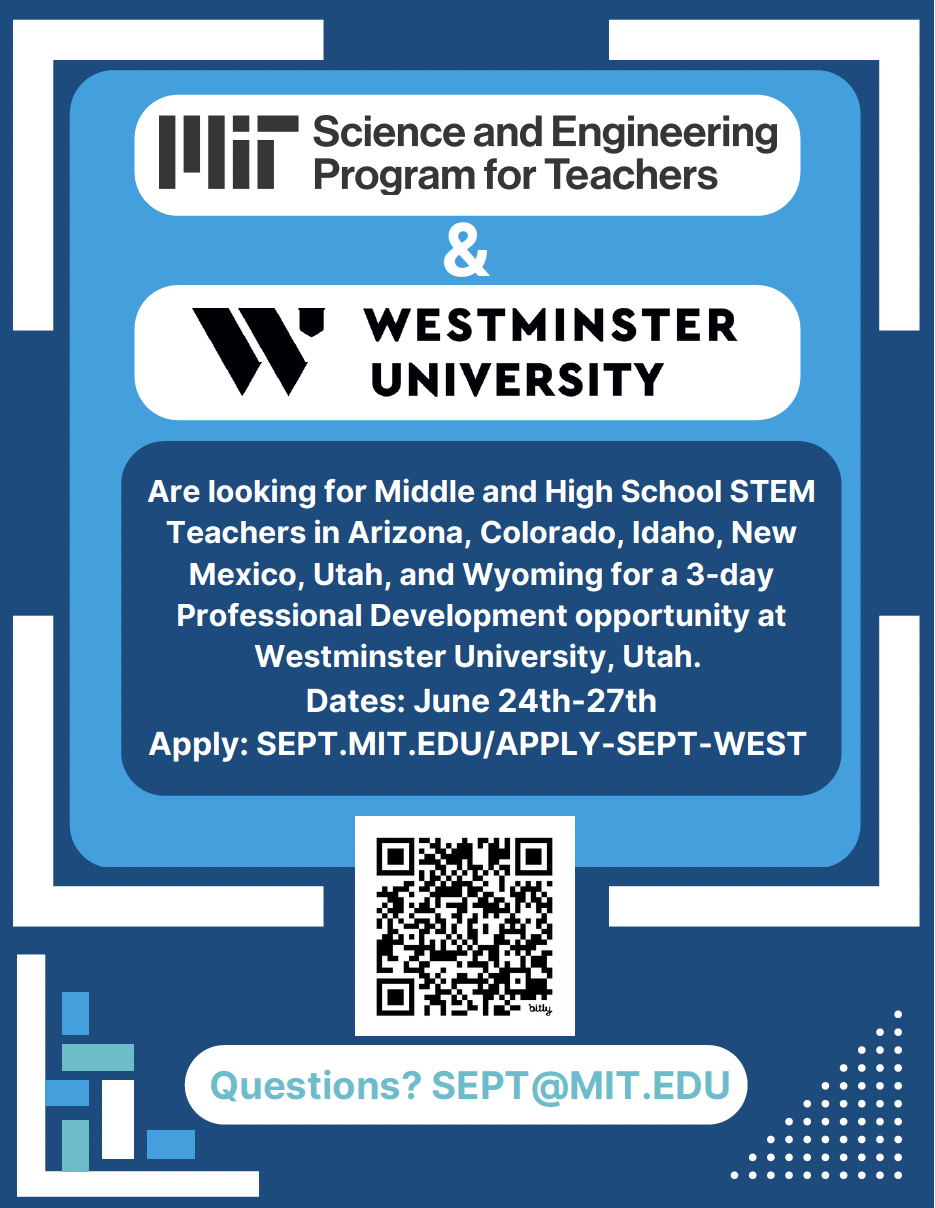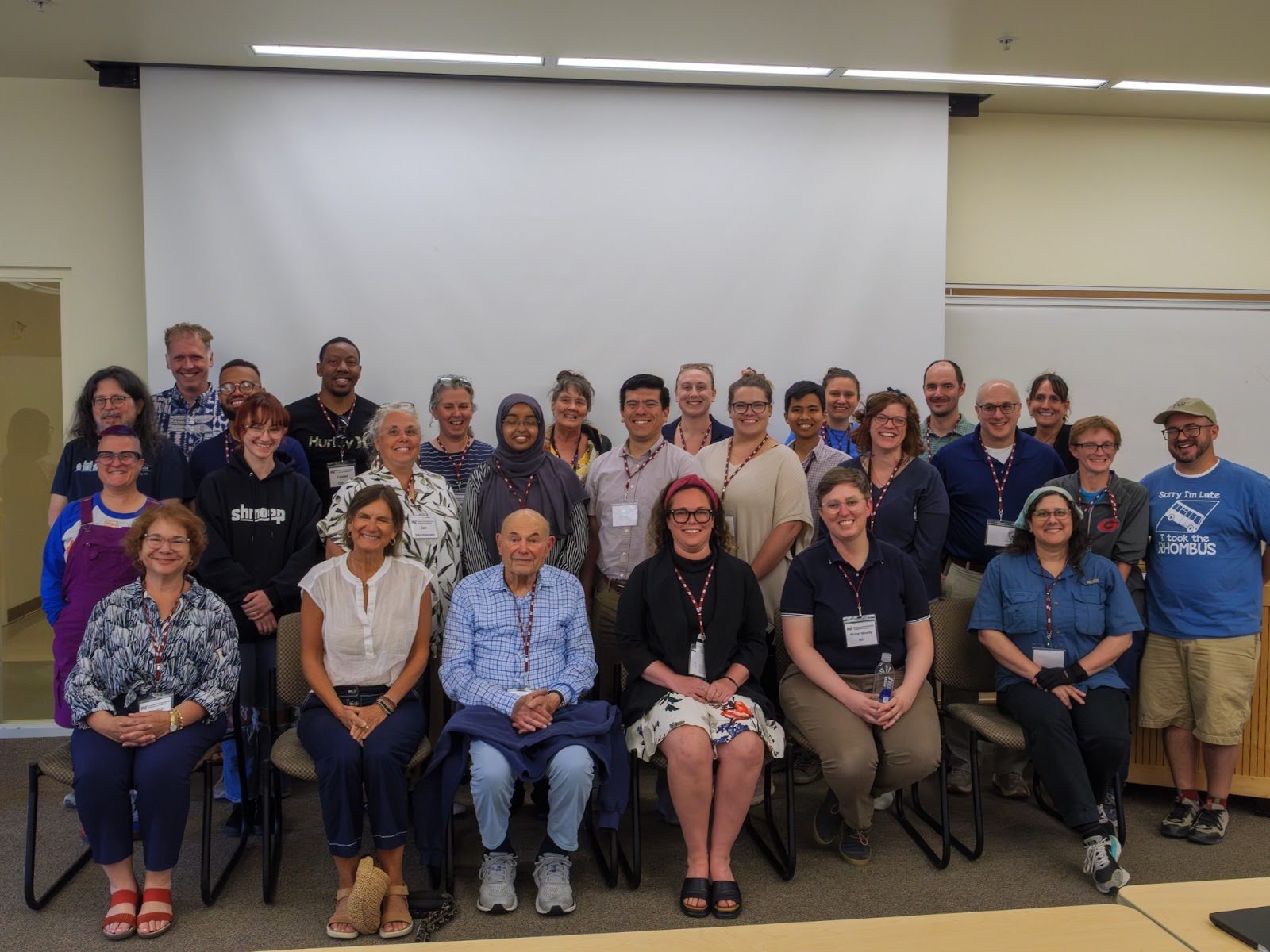Scheller Teacher Education Lab Explores How Students Can Shape the Future of AI 26 Sep 6:48 AM (25 days ago)
Centering Students in Learning About — and With — AI
In a recent article for Electrical & Electronic Engineering, Computational Sciences, and Education, Eric Klopfer and Christina Bosch of MIT’s Scheller Teacher Education Lab share their perspectives on the role of AI in education. They argue that educators — not technology — should guide how students learn in a rapidly changing digital world. Drawing on constructionist approaches, where learners build real-world projects in collaboration with others, initiatives like MIT’s RAISE, Day of AI, and RAICA (Responsible AI for Computational Action) show how students can move beyond passive use to actively create with AI. By centering creativity, collaboration, and problem-solving, schools can equip young people with both the technical skills and humanistic perspectives needed to shape the future responsibly.
You can read the full article here: https://communities.springernature.com/posts/centering-students-in-learning-about-and-with-ai
Connected Learning Summit Returns In-Person at MIT, October 6 4 Sep 6:35 AM (last month)
We’re excited to announce that the Connected Learning Summit (CLS) will be hosted in person at MIT’s campus on October 6, 2025!
CLS brings together a dynamic community of educators, researchers, designers, and innovators who are harnessing emerging technologies to expand access to participatory, playful, and creative learning.
Monday, October 6th, 3-6 pm ET
| Time (ET) | |
|---|---|
| 3-4pm | Posters and demos, reception |
| 4-5pm | Keynote speaker: Meryl Alper |
| 5-6pm | Plenary Panel: Youth Mental Health and Technology
|
Don’t miss this opportunity to connect, share, and collaborate. Register here: https://connectedlearningsummit.org/registration/
Register here: https://connectedlearningsummit.org/registration/
MIT’s Science and Engineering Program Expands West to Westminster University 13 Aug 9:43 AM (2 months ago)
In June 2025, the Science and Engineering Program for Teachers (SEPT) reached a new milestone – its first-ever regional pilot program, hosted at Westminster University in Salt Lake City, Utah. This exciting expansion brought the program’s signature mix of cutting-edge science, inspiring speakers, and collaborative learning beyond MIT’s campus for the first time, creating fresh opportunities for STEM educators in the western United States.
Twenty-seven teachers from Utah, Arizona, Washington, California, and Oregon were selected to join the inaugural SEPT West cohort. Each brought unique classroom experiences and perspectives, fostering a vibrant exchange of ideas throughout the week.
The program kicked off on Tuesday, June 24, with a welcome dinner and remarks from SEPT founders Ron Latanison and Joe Scheller.
Wednesday began with a keynote from Eric Klopfer, Director of the Scheller Teacher Education Program (STEP) Lab at MIT, who traced the program’s history and outlined our goals for the week. Dr. Marilee Coles-Ritchie, Professor of Education at Westminster University, followed with an interactive session that challenged and inspired participants.
From Wednesday through Friday, teachers engaged in hands-on breakout sessions in their chosen track:
-
Broadening Participation in the Classroom
-
Games and Simulations in the Classroom
Thursday morning’s highlight was an energizing talk by Dr. Bonnie Baxter, Professor of Biology at Westminster University and Director of the Great Salt Lake Institute. Her presentation set the stage for that afternoon’s field trip to the Great Salt Lake—a memorable mix of science, nature, and camaraderie.
On Friday, Dr. David Kaiser, Germeshausen Professor of the History of Science and Professor of Physics at MIT, delivered a fascinating talk before participants headed to the Natural History Museum of Utah for their final off-campus learning experience. The program wrapped up that afternoon with group presentations, where each track shared the projects and ideas developed during the week.
Teachers Feedback about the Experience:
Post-event survey results painted a clear picture: the SEPT West pilot was a resounding success. Participants praised the quality of the speakers, the relevance of the content, and the sense of community fostered throughout the week.
“The speakers were amazing, and I loved the way they wanted us to interact with them. I appreciated that they weren’t giving an ‘infomercial’ or trying to sell us something—they just shared the science they love.”
“The conversations were meaningful and interesting. I felt validated by this workshop in how I’ve been feeling for a while.”
“To be honest, I find it hard to believe you offer such a top-notch program for educators. It’s like a hidden gold mine, and I feel exceptionally privileged to learn from it. I’ve talked with world-renowned data scientists, top materials scientists, and leaders in their fields, and I reference what I learned at SEPT on a weekly basis. Rachel Moody’s discussion on imposter syndrome helped me move from feeling like an imposter in STEM to being sought after. You have my eternal gratitude. I hope you share the impact this program has had—on me, my students, and the surrounding schools—with the Schellers for supporting it.”
These reflections underscore SEPT West’s unique role, not just as professional development, but as a powerful, affirming, and energizing space for STEM educators. With its successful launch, SEPT West promises to be a cornerstone for teacher growth and collaboration in the years ahead.
If you’re interested in applying for next years program, please email us @sept.mit.edu.
Call for Proposals is open for the Connected Learning Summit 29 May 9:07 AM (4 months ago)
The Call for Proposals is open for the Seventh Annual Connected Learning Summit, taking place October 5–10, 2025! CLS invites submissions of Research Papers and Showcases that focus on digital technologies for learning, educational and commercial games, innovative tech-infused curricula, and theoretical and/or empirical exploration of digital media and technology for learning.
Accepted Showcases and Research Papers will have an opportunity to participate in an in-person poster session as part of the new hybrid format this year. This is a chance to share your work with fellow CLSers face-to-face, in addition to the online format being offered again this year.
We are excited to announce that we will be hosting an in-person poster session, keynote, and plenary panel at MIT’s Media Lab, on Monday October 6th, 2025. The poster session will take place 3:00-4:00pm, and will be part of an afternoon and evening kickoff event that will include a keynote speaker and plenary panel. Details on the keynote and plenary will be forthcoming.
We hope you’ll consider submitting a poster or demo for the session, and joining us both online and in person! There will also be local poster sessions at NYU, Stanford, and UC Irvine.
When you submit your Showcase proposal or Research paper, you will have the opportunity to indicate whether you would be interested in presenting at our in-person event. We will do our best to support all accepted Research Papers and Showcases who are interested in presenting locally, space permitting.
The CLS2025 Call for Proposals closes June 23!
Learn More and Submit
Maureen Hughes of the STEP Lab Recognized with 2025 MIT Levitan Teaching Award 7 May 11:48 AM (5 months ago)
We are proud to share that Maureen Hughes of the STEP Lab has been named a recipient of the 2025 MIT Levitan Teaching Award. This prestigious recognition honors outstanding teaching and dedication to student learning across the Institute. Maureen’s commitment to innovative, student-centered instruction exemplifies the values at the heart of MIT’s educational mission. Please join us in congratulating her on this well-deserved honor.
Six educators have received the James A. (’48) and Ruth Levitan Award for Excellence in Teaching for 2025. The award, given annually by the MIT School of Humanities, Arts, and Social Sciences (SHASS), honors superlative teachers across the school. Winners are nominated by MIT students.
“These educators are some of the finest instructors at MIT. Their dedication to our students makes a real difference and is deeply appreciated,” says Agustín Rayo, Kenan Sahin Dean of SHASS.
Click to read more about this prestigious award: bit.ly/4md66LV
Exploring AI’s Role in Learning: Eric Klopfer on the AI Impact Podcast 17 Apr 6:24 AM (6 months ago)
Applications for the 2025-2026 STEP cohort are now open! 4 Apr 10:05 AM (6 months ago)
Want to become a teacher? The Scheller Teacher Education Program offers a pathway for MIT students to receive STEM teaching licensure in Massachusetts. Applications for the 2025-2026 STEP cohort are now open! Spend your year as a student teacher in a local classroom and grow as an educator. Learn from current and former teachers from across the Boston area. Make an impact!Don’t wait to apply! Applications are due April 25.
Questions? Reach out to step-management@mit.edu
Link: https://docs.google.com/forms/d/1MS0NL4AneKKFGLIABTfIBzBwG9JydsNM-GDZ6TJL0PU/edit
Announcing our first Science and Engineering Program for Teachers at Westminster University, Utah! 11 Feb 1:49 PM (8 months ago)

STEP Lab on Silver Lining for Learning Podcast 11 Feb 1:38 PM (8 months ago)
STEP | TEA Lab research scientists Emma Anderson, Christina Bosch, and Grace Lin were featured on the Silver Lining for Learning podcast Episode 221, where they shared insights and thoughts on AI education and AI for Education.
To watch or listen to the podcast, click here.
From the Silver Lining for Learning website:
In this episode, we will hear from the MIT STEP Lab on two of their AI initiatives: Collaborative Artificial Intelligence for Learning (CAIL) and RAICA (Responsible AI for Computational Action). Collaborative Artificial Intelligence for Learning (CAIL) is a research and design project at the MIT Step Lab focused on integrating innovative AI tools in the classroom to support learning in collaborative groups. RAICA (Responsible AI for Computational Action) designs curriculum focusing on computational action with artificial intelligence for late primary, middle, and secondary students.
Collaborative Artificial Intelligence for Learning (CAIL) is a research and design project focused on integrating innovative AI tools in the classroom to support learning in collaborative groups. Students interact with AI-powered conversational agents in group work and discussions. The agent is envisioned as a peer who would promote deeper thinking on the topics instead of an efficiency tool. We also aim to provide real-time information to teachers and students to support teachers’ formative assessment and students’ self reflection. As part of the project, we are building out CAILA (Collaborative Artificial Intelligence for Learning and Analysis) to process the real-time data while keeping with human- and child-centered design principles and keeping humans in the loop. To date, we have created conversational agents to work with high school students in PBL data science workshops and investigated potential roles the agents could play in team-building exercises. Our lines of inquiry span from the personas and roles of the agents to analytic tool development to formative and reflective assessments for learning.
The goal of the RAICA curriculum is computational action with artificial intelligence for late primary, middle and secondary students. In order for students to take computational action with AI, RAICA has designed lessons that provide opportunities for students to apply computational thinking and responsible design while growing their AI fluency. We approach all of our work with a constructionist pedagogy, a belief that students learn best by constructing their own knowledge and being creative. We use Universal Design for Learning (UDL) and the Technological, Pedagogical, and Content Knowledge (TPACK) frameworks to guide the design of RAICA’s materials to support student and teacher learning.
We are bringing back a popular EdTech course series! 21 Jan 10:38 AM (9 months ago)
We are excited to announce the relaunch of 11.132x: Design and Development of Educational Technology.
Reviving a Popular EdTech Course Series
Ten years ago, STEP/TEA launched a series of four MOOCs focused on the design, development, implementation, and evaluation of educational technologies, including games for learning. After running for several cycles, the courses were archived. Now, a decade later, we are updating the series for re-launch.
We’re excited to announce the return of 11.132x: Design and Development of Educational Technology! Recently updated by STEP staff, this course is now available on MIT’s Open Learning Library (OLL), free of charge and accessible to learners worldwide without registration.
